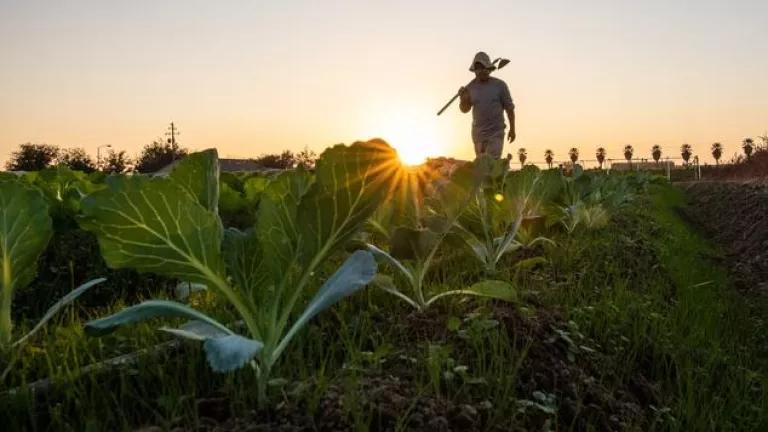The final Farm Bill was a compromise bill that wasn't as bad or as good as it could have been. While others have covered the bill's provisions for conservation programs, clean water, and food policy, I'm going to focus this blog on exploring what went wrong with one of the most innovative soil health provisions of the Senate farm bill. While a watered down version of most of the soil health and cover-cropping provisions made it into the final bill, and we can celebrate the new soil carbon demonstration pilot as a big win, we were disappointed by the final bill's removal of the Senate bill’s provision on performance-based crop-insurance discounts for risk-reducing conservation practices.
While we don't know what took place behind closed doors in Farm Bill conference committee negotiations, our best explanation for the omission come from the text of the conference committee report:
"(12) Performance-based discount The House bill amends section 508(d) of the Act to repeal the authority for performance-based discounts for producers. It also makes certain conforming amendments. (Section 10004) The Senate amendment amends section 508(d)(3) of the Act to allow the FCIC to offer premium discounts for practices that can be demonstrated to reduce risk, considering precision irrigation, fertilization, crop rotations, cover crops, and other appropriate practices. (Section 11109) The Conference substitute deletes both provisions. The Managers note that Federal Crop Insurance must be made available to all producers at rates and prices set by the RMA. Rebating is strictly prohibited by the Act, with specific limited exceptions. This prohibition against rebating, whether in the form of discounts, incentives, or other inducements, ensures fair treatment for all producers. The Managers commend RMA for taking the rebating prohibition seriously and carrying out section 508(a)(9)(B)(iii) in a manner that is consistent with Congressional intent and current law."
From this we can infer that lawmakers removed the Senate's language on performance-based discounts because it got mixed up in debates about rebating. Rebating - offering a financial incentive to farmers who purchase crop insurance from a particular company as a sales/loyalty incentive - has always been prohibited by the Federal Crop Insurance Program. Performance-based premium rates, however, are authorized by the Federal Crop Insurance Act, if they are actuarially appropriate. I'll explain what this means with an example.
If a farm practice is demonstrated to reduce risk, leading to lower crop insurance payouts for the program, then a premium rate can be adjusted accordingly; it has been shown to be actuarially appropriate. Ideally, performance-based discounts would reward farmers for using practices proven to reduce risk to crops. For example, let’s say a farmer plants a cover crop, improving the quality of her soil. The following year, there is a drought, and because her soil is healthy, her crops fare better than her neighbor’s, where no cover crops were planted. She does not have to make a crop insurance claim and her neighbor does. Accordingly, she should be rewarded with a lower premium rate. Performance-based discounts like the one in our example have always been authorized under the crop insurance program rules – the Senate bill merely made it easier for the Risk Management Agency (RMA) that oversees the program to offer these discounts. The Senate language did not authorize rebates as a sales incentive, which the crop insurance program does not allow.
So, why is NRDC advocating for performance-based discounts?
- We need to find creative ways to finance on-farm conservation. Conservation practices can be profitable, but with tight profit margins and low commodity prices, farmers have to make tough choices. Financial incentives are an important factor in a farmer's decision about what conservation practices they will use. Usually these incentives come in the form of traditional cost-share programs established in the Farm Bill. While Farm Bill conservation programs are absolutely essential to getting good stewardship on private lands, they are historically underfunded. Until Congress is willing to exponentially increase funding, we need to get creative. Clean water is at stake. The crop insurance program is now the largest farm subsidy program, and participation rates are extremely high in some of the top-producing states for agriculture (California is an exception). Performance-based discounts are a very promising way to get more conservation on the landscape and get more bang for the taxpayer's buck.
- Climate-change won't wait for farm policy to catch up. Farmers are bearing the brunt of climate change now, with drought, fire, and flood. Improving soil health is an essential task to prepare farmers for a changing climate. The crop insurance program is a prime example of the cost of climate change; from 2011-2015, climate-related crop insurance losses cost more than 40 billion dollars. We must get the crop insurance program up to date and make it a real risk management tool.
- It's a policy solution that farm groups and environmentalists can agree on. Generally, farmers want to be good stewards of the land, and environmentalists want farmers to be economically successful. It's not our principles that tend to divide us; it's our ideas about how to achieve these goals through policy. But crop insurance discounts for planting cover crops is a popular idea with farm and environmental groups - see this recent article by Iowa Farm Bureau and this NRDC guest blog by our partners in Iowa. The Senate's proposal to offer RMA more flexible authority to offer these discounts wasn't really ahead of its time - it was right on time. It's too bad that the proposal didn't make it through negotiations.
Despite this missed opportunity, we are hopeful that lawmakers will eventually catch on to the idea of performance-based, good-farming discounts. In the meantime, we'll celebrate the wins for soil health and conservation that did make it into the Farm Bill, and we'll be working to make the case for a nationwide crop insurance discount for cover cropping.



